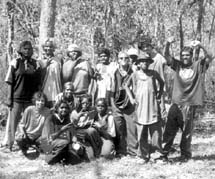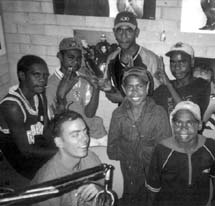CDU helps our youth tackle grog related problems
Patrick, Lynette and Nicholas from the
Community
Development Unit provide a rundown of their activities
Our aim is to support young people in the community, away from alcohol
related problems in town, whether it be supporting them to attend education
programs or to support them in the courts or to run diversionary activities.
Things to keep them busy, to combat the boredom, and to help avoid the
things that might lead to alcohol related problems in town.
At the CDU we support numeracy and literacy classes for young people,
and life skills education programs. We run a vegetable garden program,
a youth radio show; the girls do cooking, pottery and sewing, the young
fellows have done wood-working and we do a gymnasium program once a
week.
We work with Anyinginyi Sports and Rec for all the sporting activities,
we work with Anyinginyi Arts for the arts and crafts activities. We
work with the Women's Resource Centre which is run by BRADAAG for cooking
and sewing, and we work with 8CCC FM for the radio show.
We also work with Northern Territory University for the literacy and
mathematics components and we work with Alcohol AfterCare for the horse
riding programs.
If someone wants to join in they have to come and see Nicholas or myself,
or Lynette if they're a young woman, or they can speak to somebody at
Congress who'll pass the word on to us, we'll follow it up with their
families. We're in the Alcohol AfterCare facility, over at Congress,
at 68 Schmidt Street.
Lynette: I only started about 3 weeks ago. I'm supposed to set up the
program for girls, take them to NTU at the old Karguru School on Mondays
for numeracy and literacy. If they're old enough and they want to, they
can do driving, get their learners. Dawn can help the young girls get
their licence if they're old enough. She does some education skills
with them when they don't go to school, if they drop out she's there
to keep them up with those skills.
Patrick: It's a Pre-employment training program - it's for young town
camp kids who might have fallen out of the education system, so it's
like a bridging education course to help them to get work, with the
probability of them not going back to the formal education system. It's
to teach them living skills, budgeting skills, how to apply for a job,
how to fill out forms, that sort of stuff, basic computer skills, reading
and writing skills, stuff that when they become a bit older in their
teens, they might not have the access to through the high school anymore.
So it's about giving them that bridge into the workforce without having
to send them back there. That's what Dawn's doing, and the other activities
that we're doing complement the program in terms of diversionary philosophy
stuff, to keep them away from the related social issues in town that
might cause problems further on down the track
In the past we've gone to Three Ways Dam for an overnight camp. We occasionally
go out for bush trips, just to support the program and to talk about
all these issues, getting out in the bush setting, to talk to them about
the importance of attending and staying away from those sort of problems.
Nicholas:
I basically do the same thing as Lynette but with the guys - horse riding,
camping out, we've got the radio show. The radio show is at 3pm on Wednesdays
on 8CCC 92.1 FM, if people want to tune in.
Patrick:
Something else that we do is we support young people in the court process,
dealing with the police and the whole offending process. We've been
gazetted as a youth diversionary program, a pre-sentence and a post-sentence
program, so young people can come to us through either corrections or
the police or legal aid and we can help liaise with the family members
and the community members to work out the best outcome for the young
person and the community. It might be a combination of attending our
program for a certain number of hours a week and then us supervising
a community service order somewhere else or us referring them to other
agencies in town that might be better suited to their individual needs
and the community's needs in terms of the court process. This is in
response to the whole mandatory sentencing business.
We've got a number of young people in our program who've been referred
to us through corrections and the court and instead of them being penalised
for their past behaviours they're being accessed and diverted into education
and life skills programs instead and it's worked pretty well this year,
we haven't had too many reoffenders.

The CDU mob out in
the bush.

Patrick with the radio
station stars.